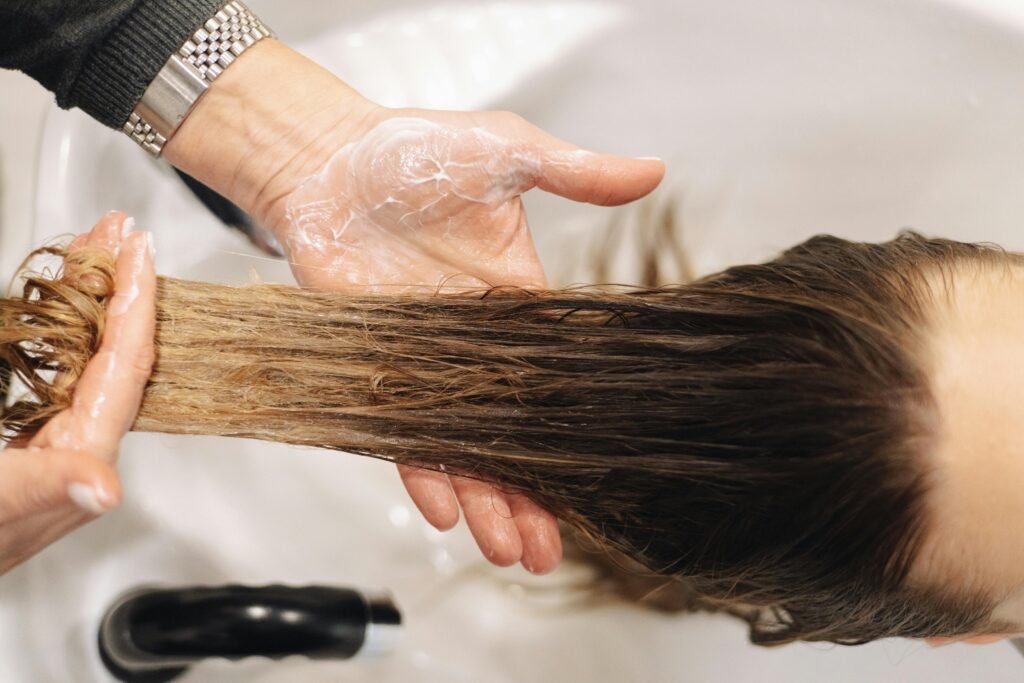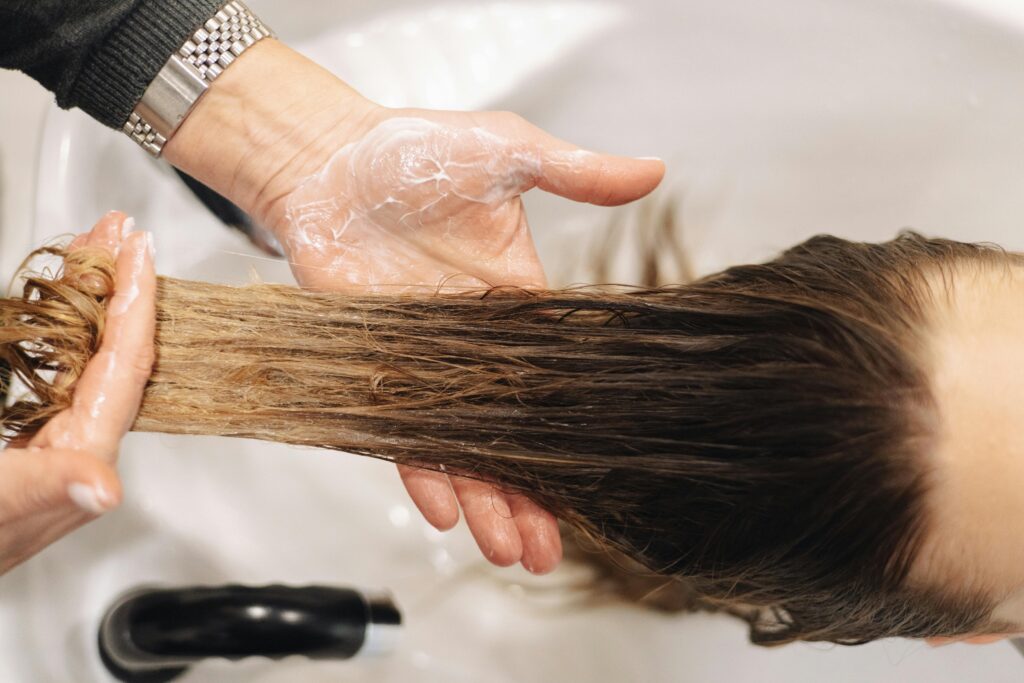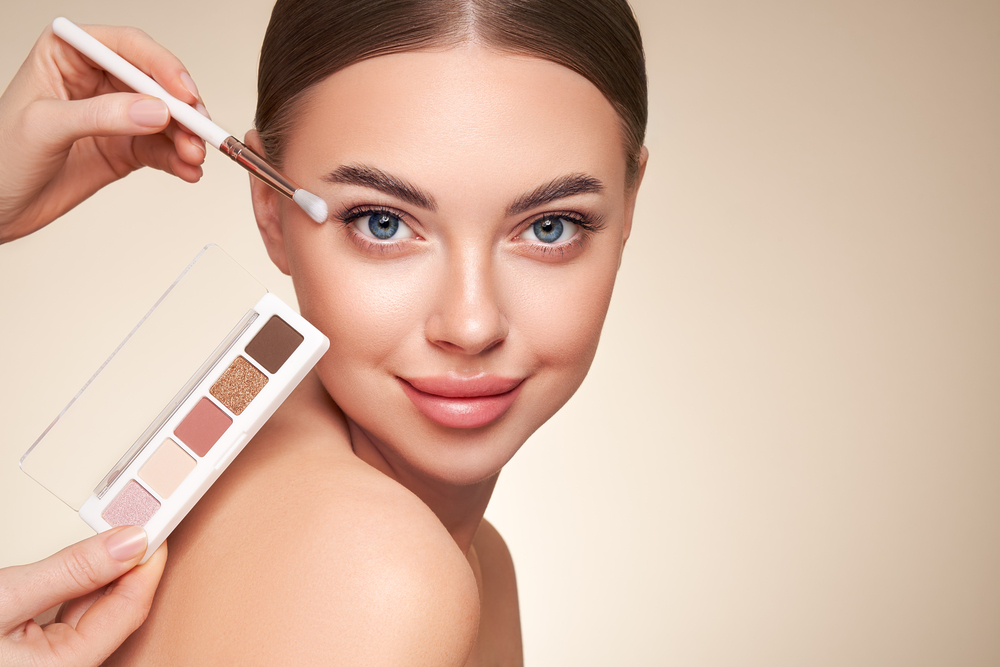
A few readers have wrote in asking: “Does conditioner cause hair loss?”, so we thought this would be a great topic to cover. Understanding the science behind conditioners and hair loss can transform your hair care routine from a guessing game to a well-informed ritual. No more second-guessing those bottles lined up in your shower.
In this article, we’ll explore:
- The role conditioners play in hair care
- Common misconceptions and the real deal about hair loss
- Expert advice on how to use conditioners effectively without fear
Understanding Conditioners and Their Role in Hair Care
Conditioners are the unsung heroes of our hair care routines, often working behind the scenes to keep our locks looking luscious. At their core, conditioners are designed to moisturize and protect the hair shaft, enhancing softness and manageability. Imagine them as a nourishing treat for your hair after it endures the cleansing process of shampooing.
Types of Conditioners
When it comes to types of conditioners, there’s a smorgasbord available to cater to different hair needs:
- Rinse-Out Conditioners: These are your classic post-shampoo companions. You apply them after washing your hair, leave them for a few minutes, and then rinse out. Think of brands like Pantene or Herbal Essences for daily use.
- Leave-In Conditioners: Perfect for those who crave extra moisture without the rinse. They stay in your hair, offering continuous hydration and detangling benefits. Look out for products like It’s a 10 Miracle Leave-In.
- Deep Conditioning Treatments: Often used weekly, these provide intense nourishment and repair. They’re like a spa day for your strands! Brands such as Olaplex or SheaMoisture are popular choices.
Benefits of Using Conditioners
The key benefits of using conditioners include improved hair manageability, reduced split ends, and enhanced shine. Personally, I’ve found that deep conditioning treatments are my go-to saviors when my hair feels more straw than silk after a week of heat styling.
The Science Behind Hair Loss
Hair loss is something many of us think about more often than we’d like to admit. Does conditioner cause hair loss? To truly understand its roots, let’s dive into the common culprits behind those stray hairs left on your hairbrush.
1. Androgenetic Alopecia
Often referred to as male or female pattern baldness, this is a genetic condition that affects both men and women. It’s characterized by a gradual thinning of hair, primarily influenced by hormonal changes and genetics. You might notice it starting with a receding hairline or a widening part.
2. Traction Alopecia
This type is all about tension. Frequently caused by hairstyles that pull tightly on the hair—like braids, ponytails, or extensions—traction alopecia can lead to breakage and eventual hair loss if not addressed early.
Beyond specific conditions, several factors contribute to hair thinning and shedding:
- Genetics: If your family has a history of hair loss, chances are you might experience it too.
- Hormonal Changes: Events like pregnancy, menopause, or even starting/stopping birth control can impact hair health.
- Lifestyle Factors: Stress, poor nutrition (hello, ramen noodle diet!), and harsh styling practices can weaken your strands over time.
Understanding these elements helps demystify the complex world of hair loss and highlights the importance of personalized care in maintaining luscious locks.
Exploring the Relationship Between Conditioners and Hair Loss
Ever found yourself pondering, does conditioner cause hair loss? You’re not alone. This question has sparked many debates, with some fervently believing that their favorite conditioner might be the culprit behind those extra strands on the shower floor. But what do the experts say?
Expert Opinions: Myth or Reality?
Dermatologists and trichologists alike have weighed in on this topic. The consensus is clear: conditioners, when used properly, are not direct causes of hair loss. In fact, they often play a crucial role in maintaining healthy hair by providing moisture and reducing friction during styling.
However, scalp buildup is a genuine concern. If conditioners are not rinsed out thoroughly or are applied too close to the roots, they can lead to product accumulation. This buildup can suffocate hair follicles, potentially resulting in weak strands and breakage. While this might contribute to temporary hair loss, it’s important to note that it’s more about improper usage than the conditioner itself.
Does Conditioner Cause Hair Loss?: Myths vs. Facts
Several myths circulate about conditioners leading to hair loss:
- Myth: All conditioners cause hair thinning.
- Fact: Most conditioners are formulated to improve hair texture and manageability without affecting the scalp or follicles.
- Myth: Conditioners contain harmful chemicals that lead to hair fall.
- Fact: While some ingredients like sulfates and parabens might irritate sensitive scalps, they are not directly linked to causing hair loss.
Conditioners function primarily by smoothing the cuticle layer of your hair shaft, making it easier to detangle and style. By addressing split ends and enhancing shine, they contribute positively to your overall hair health.
Conditions Where Conditioners Could Contribute to Hair Issues
There are scenarios where conditioners might indirectly contribute to problems:
- Improper Rinsing: Leaving residue on the scalp can cause itchiness and potential blockage of pores.
- Applying Too Close to Roots: This can weigh down hair, leading to a greasy appearance and possible follicle stress.
- Harmful Chemicals in Conditioners: For individuals with sensitive skin or allergies, certain chemicals might exacerbate scalp conditions, though they rarely cause actual hair loss.
In my own experience, I once mistakenly thought my leave-in conditioner was causing excessive shedding—only to realize I was overusing it without proper rinsing! It was a lesson learned about balance rather than blaming the product itself.
Understanding these nuances helps dispel common misconceptions about conditioner use leading to hair loss, allowing you to embrace these products confidently as part of a well-rounded hair care routine.
Proper Usage Guidelines for Conditioners to Maintain Healthy Hair
Mastering the Art of Conditioner Application
Conditioners can be your hair’s best friend, but only when used correctly. You might be tempted to slather it all over, but hold up! The proper conditioner usage starts with where and how you apply it. The golden rule is to focus on the lower two-thirds of your hair. This is where most of the damage occurs, and your roots produce natural oils that don’t need extra conditioning.
To prevent buildup on your scalp that could lead to issues like daily hair shedding, always rinse thoroughly. Imagine conditioner residue as a clingy ex – you want none of it sticking around longer than necessary.
Choosing the Right Conditioner for Your Hair Type: A Key to Healthy Locks!
Selecting a conditioner isn’t a one-size-fits-all situation. Your hair type plays a big role in what product will work best for you:
- Oily Hair: Look for lightweight formulas or volumizing conditioners. They add moisture without weighing down your strands.
- Dry Hair: Opt for deep conditioning treatments packed with hydrating ingredients like shea butter or coconut oil.
- Curly Hair: Go for products that emphasize moisture retention and curl definition, often featuring elements like argan oil or jojoba oil.
Ingredients Matter!
When browsing the shampoo aisle, check labels for ingredients that suit your needs. For those worried about does conditioner cause hair loss myths, focus on nourishing components. Ingredients like vitamin B5 are known for strengthening hair and reducing breakage, while biotin can promote healthier growth patterns.
Feeling experimental? I once tried a DIY avocado mask after reading about its benefits online. While it was a messy ordeal (note: blend really well!), my curls felt softer than ever afterward.
Next time you’re shopping for conditioners, remember these tips to maintain a healthy mane that’s as fabulous as you are!
Ingredients Matter: What to Look For (and Avoid) in Your Conditioner!
Ever peeked at the ingredient list on your conditioner bottle and felt like you were reading a foreign language? You’re not alone. Understanding what goes into your hair products is crucial, especially when it comes to potentially harmful chemicals.
Ingredients to Avoid
Sulfates are often used in conditioners for their cleansing properties, but they can be harsh on sensitive scalps, leading to dryness and irritation. Similarly, parabens—employed as preservatives—have raised concerns due to their potential link with hormonal disruptions. While these ingredients don’t directly cause hair loss, they may contribute to issues that affect your scalp’s overall health.
Ingredients to Look For
On the flip side, conditioners packed with nourishing ingredients can work wonders! Look for options containing:
- Argan Oil: Known as liquid gold for its moisturizing benefits.
- Vitamin B5: Strengthens hair and prevents breakage.
Choosing the right ingredients can make all the difference in maintaining healthy locks without sacrificing your scalp’s well-being. It’s also worth considering natural makeup ingredients which can be beneficial for your overall beauty regime. Next time you’re shopping for conditioner, think of it like picking out a new best friend—someone who supports you, rather than brings drama into your life!
Expert Perspectives on Conditioners: Are They Friends or Foes?
Expert opinions on conditioners and hair fall often reveal that these products are generally allies in our quest for luscious locks. Dermatologists and trichologists highlight that when used correctly, conditioners can enhance hair health by increasing moisture retention, reducing tangles, and minimizing breakage.
Here’s what the experts say:
- Dermatologists emphasize the importance of selecting conditioners based on individual hair type and scalp condition. They note that avoiding ingredients like sulfates and parabens can be beneficial for those with sensitive skin.
- Trichologists, who specialize in hair and scalp issues, point out that conditioners should be applied primarily to the hair shaft rather than the roots to prevent buildup, which could potentially lead to scalp irritation.
While conditioners themselves are not a direct cause of hair loss, experts suggest being mindful of how they are used. Proper application techniques and ingredient awareness are key to maintaining a healthy relationship between your conditioner and your hair.
Final Thoughts: Embracing the Truth About Conditioners and Hair Loss!
Let’s set the record straight: does conditioner cause hair loss? For most of us, the answer is a resounding no! When used correctly, conditioners are more likely to be our hair’s best friend than its enemy. They can work wonders in keeping our locks smooth, shiny, and manageable.
That being said, it’s crucial to choose products that align with your unique hair needs. Ever bought a conditioner just because it smelled like a tropical paradise, only to find out it left your hair flat and greasy? Been there, done that! Selecting the right product isn’t just about fragrance—it’s about matching it to your hair type and concerns.
- Proper Application Is Key: Apply conditioner primarily on the lower two-thirds of your hair. This technique helps avoid unwanted buildup at the roots that could lead to issues like oiliness or scalp irritation.
- Consult Professionals: If you notice unusual shedding or thinning, don’t play detective alone. Seek advice from dermatologists or trichologists who can provide tailored insights into what might be going on.
Your voice matters! Share your experiences with different types of conditioners below. Did you find one that’s your holy grail or have any you’d never use again? Let’s chat about it!
FAQs (Frequently Asked Questions)
Does conditioner cause hair loss?
No, conditioners do not directly cause hair loss. While there are myths surrounding this topic, the primary factors contributing to hair loss are genetics, hormonal changes, and lifestyle factors. Understanding how conditioners work can help you make informed choices for your hair care routine.
What are the different types of conditioners?
There are several types of conditioners, including rinse-out conditioners, leave-in conditioners, and deep conditioning treatments. Each type serves a specific purpose, such as improving manageability, providing moisture, or repairing damaged hair.
What should I look for in a conditioner to prevent hair loss?
When selecting a conditioner, choose one that is suitable for your hair type (oily, dry, curly) and contains beneficial ingredients like argan oil or vitamin B5. Avoid harmful chemicals such as sulfates and parabens that may irritate sensitive scalps.
How can improper use of conditioner lead to hair issues?
Improper usage of conditioner can lead to scalp buildup and breakage if not applied correctly. It is essential to apply conditioner only to the lower two-thirds of your hair and rinse thoroughly to prevent any residue that could harm your scalp health.
Are there any harmful chemicals in conditioners I should avoid?
Yes, some common harmful chemicals found in conditioners include sulfates and parabens. These ingredients may affect sensitive individuals and could lead to irritation or damage. Opting for products with natural alternatives can promote healthier hair.
What do experts say about the relationship between conditioners and hair health?
Experts, including dermatologists and trichologists, generally agree that when used correctly, conditioners can be beneficial for scalp health and overall hair quality. They emphasize the importance of proper application techniques and choosing the right products based on individual needs.


